

13-15 oct. 2021 Greta Thunberg : « L’inaction climatique est un choix délibéré » La militante Greta Thunberg, initiatrice des « grèves de l’école pour le climat » a été interviewée le 6 octobre 2021 dans son appartement à Stockholm, en Suède, par NBC News, Reuters et The Nation.

Il est republié ici — dans une version traduite et plus concise — dans le cadre de Covering Climate Now, une collaboration mondiale de plus de 250 médias pour renforcer la couverture des changements climatiques. Covering Climate Now — À la conférence Youth4Climate le 28 septembre, en Italie, vous avez employé l’expression « bla-bla-bla » qui est devenue virale. À qui ce « bla-bla-bla » était-il adressé ? Greta Thunberg — Il visait surtout les personnes qui gouvernent le monde aujourd’hui. J’ai repris des paroles prononcées par de nombreux dirigeants mondiaux, et il m’a paru évident que cette expression les traduisait parfaitement. Pouvez-vous citer des dirigeants sur la scène mondiale qui prennent la situation climatique au sérieux et dont les actions sont en accord avec leurs paroles ?
21 août 2021 As disasters mount, central banks gird against threat of climate change. 29 jlt 2021 Eliminating Carbon Emissions by 2050 Would Save 74 Million Lives This Century: Study. Providing further evidence of the deadly consequences of the fossil fuel-driven climate emergency and the far-reaching health benefits of decarbonization, new research out Thursday shows that eliminating greenhouse gas emissions within the next three decades would save tens of millions of lives around the world.

Roughly 74 million lives could be saved this century if the emission of heat-trapping gases is cut to zero by 2050, compared with a far more lethal scenario in which society fails to limit global temperature rise to less than 4°C. That's according to Daniel Bressler, a Ph.D. candidate at Columbia University's Earth Institute whose peer-reviewed journal article, "The Mortality Cost of Carbon," was just published in Nature Communications. There is "a significant number of lives that can be saved if you pursue climate policies that are more aggressive than the business-as usual scenario," Bressler told The Guardian. "I was surprised at how large the number of deaths [is].
18 mai 2021 Study: Climate change to blame for $8 billion of Hurricane Sandy damages. There is a universe in which Hurricane Sandy didn’t create quite so much devastation back in 2012; where the waters, which surged deep into subway tunnels and left parts of New York City in the dark for days, left some parts of the tri-state area unscathed.
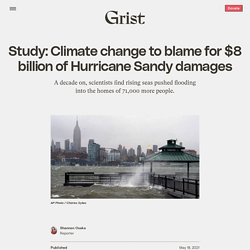
And that universe, according to scientists, is one without climate change. Superstorm Sandy destroyed half a million homes, killed 159 people, and caused $62.5 billion in damages. And, according to a new study out Tuesday in Nature Communications, 13 percent of its costs can be attributed to human-caused sea-level rise. In other words, without warming temperatures and rising seas, tens of thousands of homes would have gone untouched, and $8.1 billion of damages would not have occurred. 25 jan. 2021 Le palmarès 2021 des pays les plus menacés par le changement climatique - Geo.fr. 28 déc. 2020 Climat: en 2020, des catastrophes toujours plus coûteuses, selon une ONG - Geo.fr. Selon le rapport annuel de Christian Aid, les dix catastrophes météo les plus coûteuses de 2020 ont presque atteint les 150 milliards de dollars et fait plus de 3.500 morts.

Les dix catastrophes météo les plus coûteuses de 2020 ont presque atteint les 150 milliards de dollars de dommages assurés, un chiffre plus important qu'en 2019 qui reflète l'impact grandissant du réchauffement climatique, selon une ONG britannique. Ces dix catastrophes ont fait également 3.500 morts et ont déplacé plus de 13,5 millions de personnes, selon le rapport annuel de Christian Aid. Des méga-feux qui ont ravagé l'Australie aux ouragans en série dans les Caraïbes, le véritable coût des événements climatiques extrêmes de 2020, renforcés par le réchauffement, est en réalité bien plus élevé, la plupart des dommages n'étant pas assurés, insiste l'ONG.
30 oct. 2020 Australie: des catastrophes plus "graves et fréquentes", selon la commission des feux de 2019/2020. (74) Jancovici : James Finance contre Docteur Carbone - Genève - 17/09/2020. U.S. regulators woke up and realized climate change could cause a financial crisis By Emily Pontecorvo on Sep 10, 2020 at 3:56 am. Some economics nerds just realized how much climate change will cost us. A bunch of economists just put down their calculators and concluded that we should act on climate change sooner rather than later.
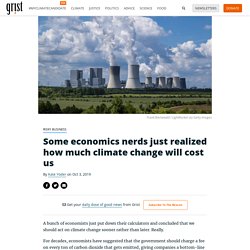
Really. For decades, economists have suggested that the government should charge a fee on every ton of carbon dioxide that gets emitted, giving companies a bottom-line incentive to change their polluting ways. The conventional wisdom is that we’d ease into it, starting with a low price — say, $40 per ton — and gradually ramp it up over time. But according to a new paper in the Proceedings of the National Academy of Sciences, that prevailing wisdom is backwards. The authors argue that a carbon tax should start out steep, above $100 per ton (and potentially above $200 per ton), rise higher for a few years, and then slowly fall over the next few centuries as people get the whole climate crisis thing under control. Sea-level-rise-might-cost-the-world-14-trillion-a-year-by-2100. The world is waking up to the big financial risks of global warming. This story was originally published by Newsweek and is reproduced here as part of the Climate Desk collaboration.
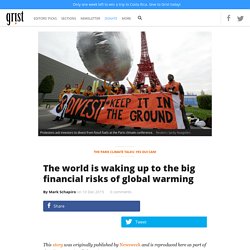
A European and an American walk into their local bank. Each has a savings account. The banks have the same antiseptic feel, their cash machines make the same robotic moves. There is one fundamental difference between the two, however — how they account for the vulnerability of their assets to climate change. Climate change more catastrophic for the global economy than we thought. When it comes to climate change, the dark truth is that most people couldn’t care less about it crippling the environment.
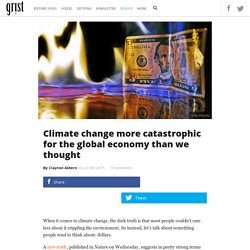
So instead, let’s talk about something people tend to think about: dollars. A new study, published in Nature on Wednesday, suggests in pretty strong terms that climate change will do some serious wallet damage on a global scale. On average, the authors predict we’ll see a 23 percent reduction in projected global output by 2100 due to climate change (relative to a world without it).
Until now, that kind of catastrophic shock to the economy was considered to be more or less a worst-case scenario — but now, it’s looking like it might be par for the course. “Historically, people have considered a 20 percent decline in global Gross Domestic Product to be a black swan: a low-probability catastrophe,” said co-author Solomon Hsiang of U.C. How much is climate change going to cost us? How much is climate change going to cost us?
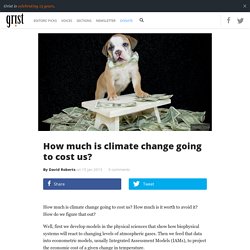
How much is it worth to avoid it? How do we figure that out? Climate Change: Assessing The Potential Long-Term Effects. El Niño could raise meteorological hell this year. It’s more likely than not that El Niño will rise from the Pacific Ocean this year — and some scientists are warning that it could grow into a bona fide monster.

NOAA’s Climate Prediction Center put out a bulletin Thursday saying there’s a greater than 50 percent chance that El Niño will develop later this year. Australian government meteorologists are even more confident — they said earlier this week that there’s a greater than 70 percent chance that El Niño will develop this summer. Not totally clear on what this El Niño thing even is? Andrew Freedman explains at Mashable: Le coût extrême du réchauffement climatique. Le réchauffement climatique pourrait avoir un coût considérable sur les économies des pays du monde entier.
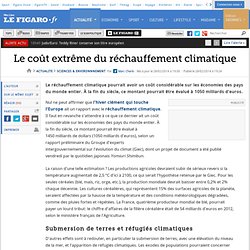
À la fin du siècle, ce montant pourrait être évalué à 1050 milliards d'euros. Report: Climate change affecting corporate bottom lines. Climate change isn’t just causing the ice caps to melt; it’s costing corporations big bucks and forcing some to factor its likely impact into their long-term plans. A new report from the Carbon Disclosure Project (CDP) released Friday says 63 of America’s S&P 500 companies are already paying to counter the effects of climate change. The past few years of extreme drought, stronger hurricanes and severe flooding have caused immense damage to some businesses’ core assets, requiring millions of dollars in repairs and threatening billions more in future profits. Fossil fuel giants asked to run 'climate stress test' at UN summit. New York ‘climate risk’ meeting will call on oil majors to evaluate size of carbon reserves that are incompatible with warming world (Pic: UN Photo/Evan Schneider) By Ed King The world’s 48 leading fossil fuel companies will be asked to run a ‘climate stress test’ at a summit hosted at UN Headquarters in New York on Wednesday.
Lorsque le mur approche on commence enfin à se bouger (pas trop tôt) ! – alwen
Fund managers and investors attending the meeting want oil and gas majors to assess how compatible their assets are with global efforts to avoid dangerous levels of warming. US low carbon business group CERES, which runs a network of investors worth $12 trillion, is organising this week’s event. Flood pressure: Climate disasters drown FEMA’s insurance plans. When a hurricane slams into the Jersey Shore, the Federal Emergency Management Agency (FEMA) gets the call to pick up the pieces.
When a tornado lays waste to an Oklahoma community, guess where the phones start ringing? FEMA. And when a foot and a half of rain falls around Boulder, Colo., sending hundreds of homes into the drink? Yep: FEMA again. Les chances de limiter le réchauffement climatique diminuent, alerte l'ONU. Berlin - Les chances de contenir le réchauffement climatique à 2°C au cours du siècle diminuent sensiblement, met en garde un nouveau rapport des Nations unies mardi, publié avant la conférence annuelle sur le climat à Varsovie.
Delaying climate action will triple costs. If the world puts off cooperative efforts to fight climate change until 2030, they will be more than three times as expensive as they would be in 2015. That’s according to a study led by the Potsdam Institute for Climate Impact Research, published Wednesday in the journal Environmental Research Letters. A team of researchers modeled the economic impacts of possible international climate agreements and found that if the world starts in 2015 to take the difficult but necessary steps to limit global warming to below 2 degrees Celsius, then international economic growth would be crimped by 2 percent. But delaying those steps until 2030 would mean growth is curtailed by about 7 percent.
We’re massively underestimating climate costs, experts warn. Crank up global temperatures by 30-odd degrees and humans could plummet toward extinction. Yet one of the world’s most cited economic models on climate-change effects projects just a 50 percent reduction in global economic output if temperatures rise that much. That’s an example of how substantially we’ve been underestimating the costs of climate change. So argues a new peer-reviewed paper in The Economic Journal written by Nicholas Stern, author the famed 2006 Stern report on the economics of climate change, and Simon Dietz, both of the Grantham Research Institute on Climate Change and the Environment. And, in part because we’re relying on an outdated economic model, carbon-trading programs are woefully undercharging polluters for their climate-wrecking emissions.
Who's Gonna Pay For Global Warming? Climate-related disasters cost American taxpayers $96 billion last year. La bombe à retardement climatique fait trembler Davos. Ce qui restait jusqu'à présent le credo de certains écologistes férus d'économie et de plus rares économistes (dont Joseph Stiglitz ou Nicholas Stern) ouverts aux thèses environnementales, pénètre le saint des saints de l'économie mondiale. Alors que la plupart des acteurs économiques, gouvernements, financiers, chefs d'entreprises et consommateurs confondus prennent prétexte de la crise économique pour repousser les investissements nécessaires au traitement de la crise environnementale, l'étude consacrée aux risques, publiée en amont du sommet de Davos, démontre que cette attitude ne fait qu'aggraver les choses. GlobalRisks_Report_2013.pdf (Objet application/pdf) Insurers Stray From the Conservative Line on Climate Change. Photo If there were one American industry that would be particularly worried about it would have to be , right?
From ’s devastating blow to the Northeast to the protracted drought that hit the Midwest Corn Belt, natural catastrophes across the United States pounded insurers last year, generating $35 billion in privately insured property losses, $11 billion more than the average over the last decade. And the industry expects the situation will get worse. Insurer: Hey, these climate-related disasters are getting expensive.